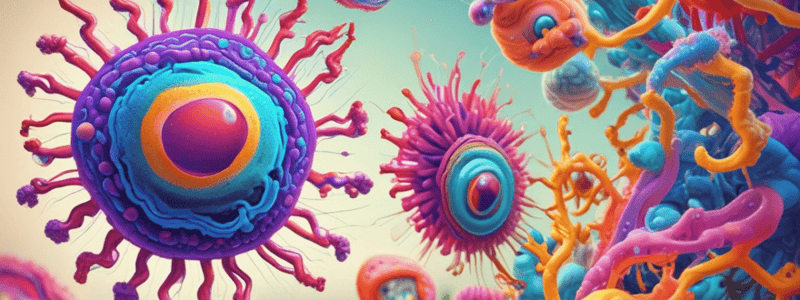Podcast
Questions and Answers
What branch of biology deals with interactions among organisms and their environments?
What branch of biology deals with interactions among organisms and their environments?
- Botany
- Genetics
- Zoology
- Ecology (correct)
What is the process by which species change over time through genetic variation and natural selection?
What is the process by which species change over time through genetic variation and natural selection?
- Evolution (correct)
- Adaptation
- Mutation
- Gene flow
Which concept favors individuals with traits that increase their chances of survival and reproduction in their environment?
Which concept favors individuals with traits that increase their chances of survival and reproduction in their environment?
- Population dynamics
- Natural selection (correct)
- Gene regulation
- Genetic mapping
Flashcards are hidden until you start studying
Study Notes
Understanding Biology: From Cells to Ecosystems
Biology is a vast field of knowledge that encompasses everything from the tiniest cells to entire ecosystems. It is the study of life processes and the organisms that inhabit our planet. Biology covers a wide range of topics, including cellular processes, genetics, developmental biology, ecology, evolution, and much more. Let's delve deeper into some of the key aspects of biology.
Cellular Biology
At the heart of every living being is the cell, the fundamental unit of life. Cellular biology, also known as cytology, explores the structure, function, and behavior of cells. There are three main types of cells: prokaryotic (such as bacteria), eukaryotic (found in multicellular organisms like humans), and archaea (single-celled organisms that resemble both prokaryotes and eukaryotes). Studying cells helps us understand how they divide, grow, repair, and ultimately die.
Prokaryotes vs. Eukaryotes
Prokaryotic cells lack a nucleus and other membrane-bound compartments, while eukaryotic cells contain a true nucleus surrounded by a nuclear membrane. This difference affects the organization and complexity of various cellular processes, such as DNA replication and gene expression.
Genetics
Genetics is concerned with the transmission of hereditary traits from parents to offspring. It involves the study of genes, genetic variations, and how they influence inherited characteristics. Key concepts in genetics include inheritance patterns, mutations, genetic mapping, and gene regulation. Modern genetics is heavily influenced by molecular techniques and advances in technology, allowing scientists to explore the genetic basis of various diseases and traits.
Ecology
Ecology is the branch of biology that deals with interactions among organisms and their environments. It focuses on understanding the relationships between species, populations, and communities within ecosystems. Ecologists investigate factors such as population dynamics, competition, predation, symbiosis, and adaptation to environmental conditions. Their work contributes to conservation efforts, biodiversity protection, and sustainable resource management.
Habitats and Ecosystems
Habitats refer to specific physical locations where organisms live and interact with one another. Different habitats support distinct sets of species, and ecologists study how these communities respond to changes in their surroundings. Ecosystems represent larger units that incorporate multiple habitats, including abiotic factors like temperature and rainfall. Examples of ecosystems include forests, grasslands, wetlands, and coral reefs.
Evolution and Adaptation
Evolution is the process by which species change over time through genetic variation and natural selection. It helps explain how organisms adapt to their environments and diversify into new forms. Key concepts include gene flow, mutations, and adaptation to changing environmental conditions. Understanding evolution allows us to trace the history of life on Earth and appreciate the complexity of living organisms.
Natural Selection and Adaptation
Natural selection is a central mechanism driving evolution. It favors individuals with traits that increase their chances of survival and reproduction in their environment. Over generations, these advantageous traits become more common within a population, leading to adaptation and speciation (the formation of new species).
In conclusion, biology is a fascinating and diverse field encompassing everything from microscopic cells to vast ecosystems. By studying its various aspects, we can gain a deeper understanding of life processes, the interconnectedness of living beings, and our place in the natural world. Whether you're interested in genetics, ecology, or something else entirely, there's always something new to discover in the realm of biology.
Studying That Suits You
Use AI to generate personalized quizzes and flashcards to suit your learning preferences.



